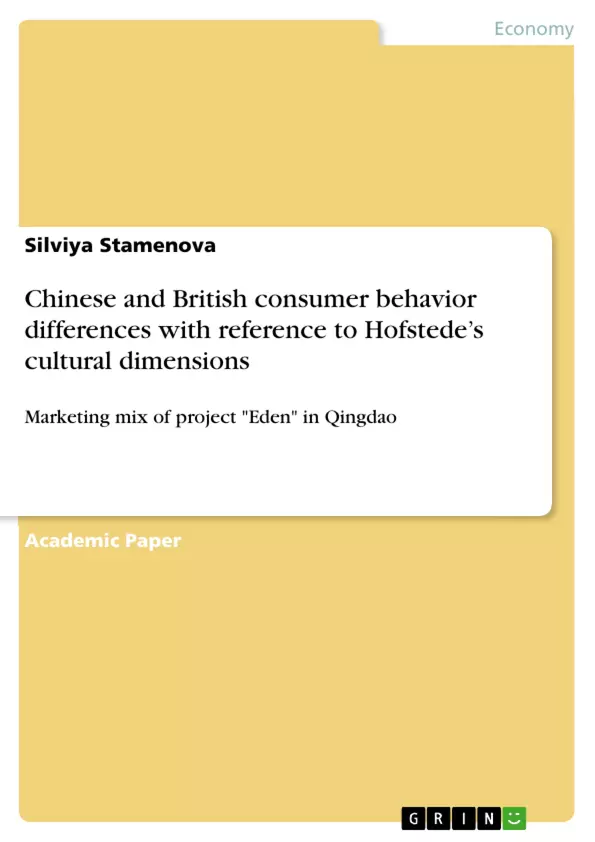Society and culture have always had an impact on people. The latter is noticeable in consumer behaviour where clientele from different parts of the world discern the same product and reply to the same marketing messages in a totally opposing way. In fact, the consumer behaviour represents merely that: the way in which different consumers select or reject certain product or service; it also considers their actions in the particular marketplace as well as the motives, standing behind them. In this regards, the Hofstede’s framework of six cultural dimensions gives a profound explanation of the consumer behaviour of people, belonging to non-identical cultures.
Within the case of Eden project Qingdao the company managers need to understand and frame marketing mix for the diverse Chinese audience, so as to be able to influence their purchasing behaviour.
Inhaltsverzeichnis (Table of Contents)
- INTRODUCTION
- BACKGROUND
- CURRENT SITUATION
- Individualism versus collectivism dimension
- The long-term versus short-term dimension
- The dimension of uncertainty avoidance
- Power distance dimension
- The masculinity versus femininity dimension
- The indulgence versus restraint dimension
- KEY CONSIDERATIONS
- OPTIONS
- On the dimension of individualism versus collectivism
- Talking about the long-term versus short-term dimension
- Regarding the dimension of uncertainty avoidance
- The power distance dimension
- The dimension of masculinity versus femininity
- The last dimension of indulgence versus restraint
- EVALUATIONS
- Marketing mix of Eden project Qingdao
- PRODUCT
Zielsetzung und Themenschwerpunkte (Objectives and Key Themes)
This text investigates the differences in consumer behavior between Chinese and British consumers through the lens of Hofstede's cultural dimensions. The goal is to provide a framework for understanding these differences and using them to develop a suitable marketing mix for Eden Project Qingdao, the first overseas attraction for the creators of Eden in Cornwall.
- Hofstede's six cultural dimensions and their application to consumer behavior
- Comparative analysis of Chinese and British consumer behavior
- The impact of cultural differences on marketing strategies
- Developing a marketing mix tailored to the specific cultural context of China
- The significance of the Eden Project Qingdao initiative in promoting sustainable practices
Zusammenfassung der Kapitel (Chapter Summaries)
The introductory chapter outlines the impact of culture on consumer behavior, emphasizing the need to understand cultural differences for effective marketing strategies. The background section introduces Eden Project Qingdao, its key themes, and its mission to address ecological and social issues. The "Current Situation" chapter dives into Hofstede's six cultural dimensions, providing a detailed description of each dimension and its relevance to consumer behavior. The chapter then presents a comparative analysis of the UK and China based on these dimensions.
The "Key Considerations" section highlights the importance of cultural differences in developing a marketing mix, emphasizing the differences between collectivist and individualistic societies. The "Options" chapter further explores the specific differences between Chinese and British consumer behavior across all six dimensions, providing insights into their purchasing preferences, decision-making processes, and motivations. The "Evaluations" chapter assesses the potential success of Eden Project Qingdao based on the cultural context and highlights the need for a marketing mix that caters to the specific needs of the Chinese market.
The final chapter, titled "Marketing mix of Eden project Qingdao," delves into the development of a marketing mix tailored to the Chinese market, with a focus on the product and its relevance to collectivist societies. It also examines the importance of brand loyalty, conformity to group norms, and the need for a long-term investment approach in the Chinese context.
Schlüsselwörter (Keywords)
The key terms and concepts explored in this text include: consumer behavior, cultural dimensions, Hofstede's framework, individualism vs. collectivism, long-term vs. short-term orientation, uncertainty avoidance, power distance, masculinity vs. femininity, indulgence vs. restraint, marketing mix, Eden Project, Qingdao, China, British culture, product strategy.
- Citation du texte
- Silviya Stamenova (Auteur), 2018, Chinese and British consumer behavior differences with reference to Hofstede’s cultural dimensions, Munich, GRIN Verlag, https://www.grin.com/document/426244



